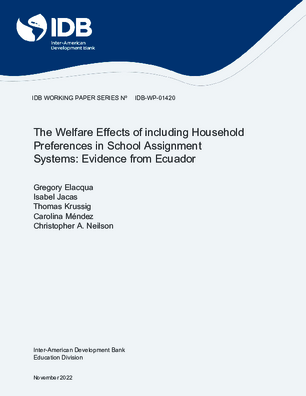The Welfare Effects of including Household Preferences in School Assignment Systems: Evidence from Ecuador
Date
Nov 2022
We study the welfare produced by a coordinated school assignment system that is based exclusively on minimizing distance to schools, comparing the matches it produces to a system that includes household preferences using a deferred acceptance algorithm. We leverage administrative data and a mechanism change implemented in the city of Manta, Ecuador in 2021 to estimate household preferences and show that considering applicant preferences produces large welfare gains. Our counterfactual exercises show that differences across alternative assignment mechanisms are small. Survey data on household beliefs and satisfaction support these conclusions. The evidence indicates that coordinated school choice and assignment systems can have large welfare effects in developing country contexts.




